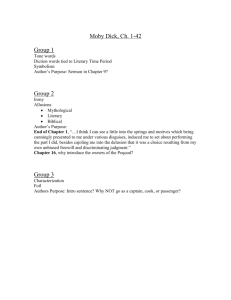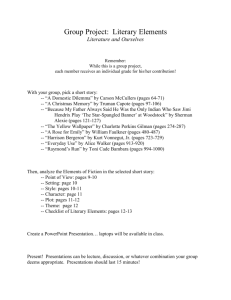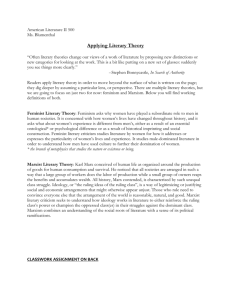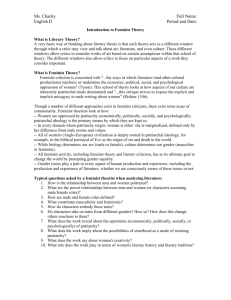Feminist Literary Criticism - Center for Social Sciences
advertisement
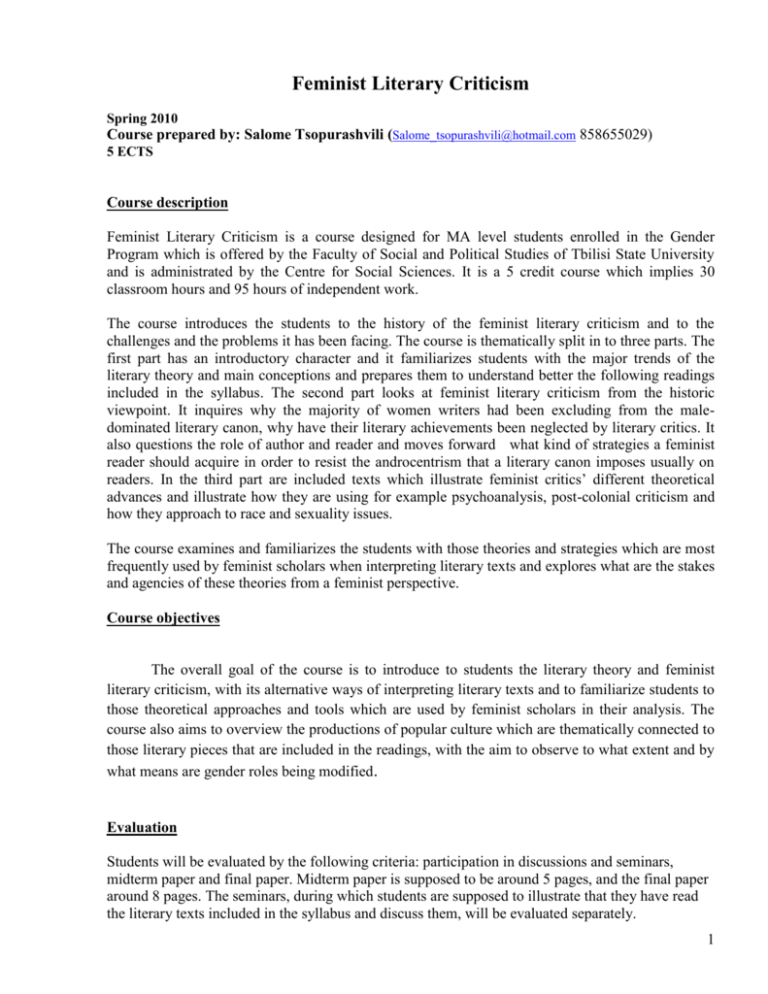
Feminist Literary Criticism Spring 2010 Course prepared by: Salome Tsopurashvili (Salome_tsopurashvili@hotmail.com 858655029) 5 ECTS Course description Feminist Literary Criticism is a course designed for MA level students enrolled in the Gender Program which is offered by the Faculty of Social and Political Studies of Tbilisi State University and is administrated by the Centre for Social Sciences. It is a 5 credit course which implies 30 classroom hours and 95 hours of independent work. The course introduces the students to the history of the feminist literary criticism and to the challenges and the problems it has been facing. The course is thematically split in to three parts. The first part has an introductory character and it familiarizes students with the major trends of the literary theory and main conceptions and prepares them to understand better the following readings included in the syllabus. The second part looks at feminist literary criticism from the historic viewpoint. It inquires why the majority of women writers had been excluding from the maledominated literary canon, why have their literary achievements been neglected by literary critics. It also questions the role of author and reader and moves forward what kind of strategies a feminist reader should acquire in order to resist the androcentrism that a literary canon imposes usually on readers. In the third part are included texts which illustrate feminist critics’ different theoretical advances and illustrate how they are using for example psychoanalysis, post-colonial criticism and how they approach to race and sexuality issues. The course examines and familiarizes the students with those theories and strategies which are most frequently used by feminist scholars when interpreting literary texts and explores what are the stakes and agencies of these theories from a feminist perspective. Course objectives The overall goal of the course is to introduce to students the literary theory and feminist literary criticism, with its alternative ways of interpreting literary texts and to familiarize students to those theoretical approaches and tools which are used by feminist scholars in their analysis. The course also aims to overview the productions of popular culture which are thematically connected to those literary pieces that are included in the readings, with the aim to observe to what extent and by what means are gender roles being modified. Evaluation Students will be evaluated by the following criteria: participation in discussions and seminars, midterm paper and final paper. Midterm paper is supposed to be around 5 pages, and the final paper around 8 pages. The seminars, during which students are supposed to illustrate that they have read the literary texts included in the syllabus and discuss them, will be evaluated separately. 1 Participation in discussions 10%+10% Presentation 15% Midterm paper 25% Term paper 50% Course Structure Part I Literature and Literary Theory: History and Main Trends Weeks 1-3 Required readings for this section: Week 1 ‘Introduction: What is Literature?’ Terry Eagleton (Literary Theory: an Introduction University of Minnesota Press, Minneapolis, anniversary edition, 2008 pp. 1-14) ‘Feminist Theory’ Gregory Castle (Blackwell Guide to Literary Theory, Blackwell Publishing 2007 pp. 94-102) Week 2 ‘Structuralism and Formalism’ Gregory Castle (Blackwell Guide to Literary Theory, Blackwell Publishing 2007 pp. 180-190) ‘Deconstruction’ Gregory Castle (Blackwell Guide to Literary Theory, Blackwell Publishing 2007 pp. 79-85) Week 3 ‘Psychoanalysis’ Gregory Castle (Blackwell Guide to Literary Theory, Blackwell Publishing 2007 pp. 163-172) ‘Post-Colonial Studies’ Gregory Castle (Blackwell Guide to Literary Theory, Blackwell Publishing 2007 pp. 135-143) Part II Women/Writers/Readers: History and Representation Required readings for this section: Week 4 Women in the literary history Women and literary history’, Dale Spender (1986) ‘Will Real Feminist theory please stand up?’, Ruth Robbins (In Julian Wolfreys (ed.), ‘Introducing Literary Theories’, Edinburgh: Edinburgh University Press, pp. 47-65.) Week 5 Women and the Literary Hisotory ‘A Room of One’s Own’, Virginia Woolf, 1929 2 ‘frTebdaglejili’ (Teared from wings) Ekaterine Gabashvili, (in ‘sakuTari oTaxi’ feministuri biblioTeka, fondi taso 2007 pp. 33-41) “dedaTa kiTxva” da/Tu “qalTa sakiTxi”(Reading our mothers or/and ‘women’s issue’ in Georgia) saqarTveloSi’ Lela Gafrindashvili , in genderi, kultura, Tanamedroveoba I, 2005, pp. 28-48 Week 6 Woman as an ‘image’ and ‘problem’ ‘The Madwoman at the Attic’, Sandra Gilbert and Susan Gubar, in ‘Literary Theory: an Anthropology’, edited by Julie Rivkin and Michael Ryan, 2004, pp. 812-825 ‘qali-saxe da problema’ (Woman-image and problem) Naira Gelashvili, in ‘qali-saxe da problema II, kritikuli werilebi’ 2005 Week 7 The Reader and the Author ‘Death of the Author’, Roland Barthes (In ‘Image, Music , Text,’ 1977) ‘What is an author?’, Michel Foucault, 1969 Week 8 Women as readers From ‘Reading ourselves: Towards a feminist theory of reading’, Patrocinio P. Schweikart, Gender and Reading: Essays on Readers, Texts, and Contexts 1986 ‘There is no such thing as reader-response theory’ Martin Mcquillan, (In Julian Wolfreys (ed.), ‘Introducing Literary Theories’, Edinburgh: Edinburgh University Press, pp. 84-96) Week 9 Writing about women in the medieval ages; Rewriting medieval romance in today’s Hollywood Courtly love: Who needs it? Recent Feminist Work in Mediaeval French tradition’, E. Jane Burns ( in Signs, volume 27, Number 1, Autumn 2001, pp.23-57) Medieval feminist literary criticism (from Feminist Literary Criticism) Lancelot (extracts) A knight’s tale (2001) Week 11 Women and madness ‘Women and madness: the critical phallacy’ Shoshane Felmase, 1975 The Yellow wallpaper Charlotte Perkins Gilman Opium: Diaries of a madwoman (2007) Week 12 French Feminism and L’ecriture Feminine ‚Castration or Decapitation?‘ Helene Cixous 3 ‚gvelis sisini: franguli feminizmi da enis filosofia‘ (French Feminism and Philisophy of Langauge) Andrea Nay, in genderi, kultura, Tanamedroveoba II, 2007 pp.75-95 Week 13 Feminist Literary Criticism and Psychoanalysis ‘‚Feminist psychoanalytic literary criticism’, Elizabeth Weed (In ‘The Cambridge Companion to Feminist Literary Theory’, Ellen Rooney (ed.), New York: Cambridge University Press, 2006) ‘oTaraanT qvrivi: qarTveli qalis zneobrivi ideali’ (Otaaraankt Kvirvi-moral ideal of Georgian woman) Dodona kiziria, in literaturuli saqarTvelo, 27 noemberi, 1992 Part III Race/ Sexuality/Post-Colonialism Required readings for this section: Week 14 ‘Gender and sexuality’ Gregory Castle (Blackwell Guide to Literary Theory, Blackwell Publishing 2007 pp. 102-107) Judith Butler: Gender is burning (Judith Butler ‘Bodies That Matter’, 1993, Rutledge, New York pp.121-142) Paris is burning (1990) Week 15 ‘Three Women’s Text and a Critic of Imperialism’, Gayatri Chakravorty Spivak (In ‘Literary Theory: an Anthropology’, edited by Julie Rivkin and Michael Ryan, pp. 838-853) ‘Locational Feminism, Gender, cultural Geographies, and Geopolitical Literacy’, Susan Stanford Friedman, (In ‘Feminist Locations: Global and Local, Theory and Practice’, Marianne DeKoven (ed.), New Brunswick, NJ: Rutgers University Press, 2001) 4




